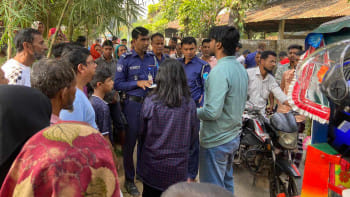The need for a comprehensive definition of rape

Bangladesh follows a 150-year-old definition of rape given in the Penal Code, 1860, which happens to be a colonial holdover. Section 375 of the Penal Code defines rape along this line: A man is said to commit 'rape' who, has sexual intercourse with a woman under circumstances falling under any of the five situations. The Code restrictively defines rape to mean only penile-vaginal penetration, even though rape, in real life, may include an array of violent actions, including, but not limited to penile-vaginal penetration.
The Penal Code also states that penetration is sufficient to constitute sexual intercourse which is a necessary element of the offence of rape. Nari O Shishu Nirjaton Daman Ain 2000 lays down that the definition of rape shall be what the Penal Code provides. Neither of the laws defines penetration or illustrates the concept of consent. In addition, rape of women and female children happen to be the only recognised form of rape under the governing laws. The definition does not encompass sexual violence against men, male children, and transgender persons. The concept of marital rape is entirely out of purview of the laws.
The jurisprudence of consent is not linear and has many complexities. For instance, when a man and a woman are romantically involved and have sexual intercourse, it happens with consent of both sides. However, it can also happen that there is consent at the beginning of the sexual relationship but later one of the partners revokes/withdraws consent to its continuation and nonetheless, the other one uses force and abuse. In this situation, what began as a consensual sexual activity, gets transformed into rape. In essence, there must be illustrations (if not a definition per se) that may render the concept of consent legally comprehensible.
The Rape Law Reform Coalition, a body comprised of 17 rights organisations, have tabled 10 demands, and the death penalty is not one of them. It aims to identify gaps in the legal and institutional framework that prevent justice for rape victims/survivors, and to formulate clear and specific reform proposals.
They are demanding a definition of rape to cover all forms of non-consensual penetration, irrespective of gender of the perpetrator or the victim/survivor. The definition of 'penetration' for the purposes of determining rape, is demanded to include penetration by use of 'objects' or any part of the perpetrator's body.
They demand that the term 'child' under the Nari O Shishu Nirjaton Daman Ain 2000 include male children. They also demand that a Victim and Witness Protection Act according to the draft prepared by the Law Commission in 2006/ 2011), (for institutional protection, emergency shelter, livelihood support, psycho-social support, and protection of identity or relocation as required, of victims/ witnesses) is put in place and that protection is continued until the victim's and witness's safety is no longer threatened.
The coalition also demands that the laws enable judges to exercise discretion in sentencing by taking into account both mitigating circumstances (such as the age or mental health of the accused) and aggravating circumstances (such as the use of weapon, force or violence and the ensuing permanent physical or mental impairment of the victim/ survivor) and formulate necessary sentencing guidelines which can ensure proportionality of punishment.
An amendment is a must to be brought to Section 155(4) of the Evidence Act 1872 to abolish admissibility of character evidence of complainants in rape trials. The manner of examination and cross-examination by defence lawyers about penetration and consent in most cases goes against the basic standards of criminal justice and human rights. The lawyers try to prove the victim as 'characterless' or habituated in sexual relations. The defence lawyers should not ideally be allowed to ask humiliating or degrading questions during cross-examination of rape complainants. Unfortunately, the media and society also blame the victims encroaching indirectly on an array of rights of the victims/survivors in question.
Keeping all these gaps in law where they are and introducing death penalty can prove to be counterintuitive. Bangladesh needs, more than anything, a definition of rape encompassing coerced sexual intercourse, sexual assault, sexual violence to legally address rape. Instead of death penalty, Bangladesh therefore may consider to re-define rape to ensure that all forms of non-consensual penetration are covered by it, irrespective of gender of the perpetrator or the victim/survivor. The definition of rape should reflect that consent may be revoked at any point and that the absence of proof of force or physical resistance does not necessarily establish consent in any case.
The writer is a Legal Economist.


 For all latest news, follow The Daily Star's Google News channel.
For all latest news, follow The Daily Star's Google News channel. 



Comments